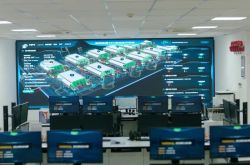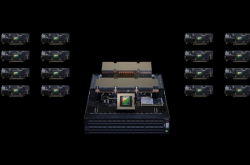Sudden! Beijing launches a 53.4 billion super IPO
![]() 10/25 2024
10/25 2024
![]() 587
587

Today, Horizon Robotics was listed on the Hong Kong Stock Exchange, becoming the "first Chinese autonomous driving stock".
Horizon opened at HK$5.12 and closed at HK$4.10, up 2.76% by the end of the day, with a market value of HK$53.422 billion. Horizon's IPO is also the largest technology IPO in Hong Kong this year.
Horizon is a supplier of advanced driver assistance systems (ADAS) and autonomous driving (AD) solutions for passenger vehicles, with revenue mainly derived from automotive solutions, including product solutions, licensing, and service businesses.
According to ZDC data, Horizon ranks fourth among all advanced driver assistance and autonomous driving solution providers in China based on total installed capacity of solutions in 2023 and the first half of 2024. As of September 30, Horizon's hardware-software integrated solutions have been adopted by 27 OEMs (Original Equipment Manufacturers) and installed in 290 models.
Founded in 2015, Horizon is headquartered in Haidian District, Beijing, with Yu Kai as its founder and CEO.
Yu Kai is from Nanchang, born in November 1976. He graduated from the Affiliated High School of Jiangxi Normal University in 1994 and was admitted to the School of Electronic Science and Engineering at Nanjing University the same year. While studying as a junior, Yu Kai met Professor Xu Boling, a renowned expert in acoustic audio, and became fascinated with artificial neural networks after learning about their research from him. Yu Kai has been devoted to this field ever since. During his graduate studies in 1999, his first published paper was also about neural networks, and his master's thesis focused on using artificial neural networks to solve the cocktail party effect in speech recognition.
After completing his graduate studies in 2000, Yu Kai went to Germany for further studies and obtained his Ph.D. in Computer Science from Ludwig van Beethoven University in Munich, Germany, in 2004.
After completing his Ph.D., Yu Kai first worked as a researcher at the Siemens Research Center in Germany. From 2006 to 2012, he served as the Director of the Media Lab at NEC Research Institutes in America. Abroad, Yu Kai "focused mainly on research and writing papers, publishing over 100 papers. When he returned to China, he was likely one of the few Chinese scholars with the highest citation rates in the field of artificial intelligence." In 2010, Yu Kai led the research team at NEC Laboratories to win the first ImageNet challenge (known as the Olympics of deep learning and artificial intelligence).
Yu Kai returned to China in 2012 and served as Senior Director of Baidu's Multimedia Department and Image Search Product Department, Executive Deputy Dean of Baidu Deep Learning Research Institute, and Executive Dean of Baidu Research Institute from 2012 to 2015.
In 2015, Yu Kai founded Horizon to develop automotive-grade chips for autonomous driving. At the time, Horizon was the first company in China to enter the field of deep neural network chips from a software algorithm perspective and was also one of the earliest companies in China to develop dedicated deep neural network chips.
Since its establishment, Horizon has received multiple investments, raising a cumulative total of over $3.4 billion (approximately RMB 24 billion). After completing its Series D funding round on December 28, 2023, its valuation reached $8.71 billion (approximately RMB 61.6 billion).
Horizon's investors include industry capital and renowned investment institutions such as SAIC Motor, GAC Group, CATL, BYD, Sunny Optical, Hillhouse Capital, Sequoia Capital, Yunfeng Capital, Matrix Partners China, and Intel, covering the upstream and downstream of the automotive industry chain.
Among them, (before the IPO), Yu Kai personally held 14.85% of the shares, SAIC held 8.78%, Hillhouse Capital held 3.24%, Sequoia Capital held 2.36%, Intel Capital held 1.36%, and BYD held 0.11%.
The prospectus shows that Horizon's revenue for 2021-2023 and the first half of 2024 (hereinafter referred to as the "reporting period") was RMB 467 million, RMB 906 million, RMB 1.552 billion, and RMB 935 million, respectively. Revenue for the first half of this year was RMB 935 million, representing a year-on-year growth of 151.6%.
During the reporting period, Horizon's operating losses were RMB 1.335 billion, RMB 2.132 billion, RMB 2.03 billion, and RMB 1.105 billion, respectively. The net losses were RMB 2.064 billion, RMB 8.72 billion, RMB 6.739 billion, and RMB 5.098 billion, respectively, with a cumulative net loss of over RMB 22.6 billion over three and a half years. Horizon attributed the losses primarily to continued investment in research and development.
The large pie of autonomous driving is too tempting, and technology investment is necessary to seize the high ground. According to ZDC data, by 2030, the share of advanced autonomous driving solutions in driving automation solutions will exceed 60%. It is expected that by 2027, nearly half of the driving automation solutions deployed in Chinese passenger vehicles will be advanced autonomous driving solutions, and by 2030, this proportion will further increase to over 80%.
This article does not constitute any investment advice. This article also references content from CNR Finance, Shanghai Securities News, Nanjing University's official website, and Yu Kai's speech at the Matrix Partners China Annual Meeting, and we extend our gratitude to all sources. The cover image is from the company's official website.








